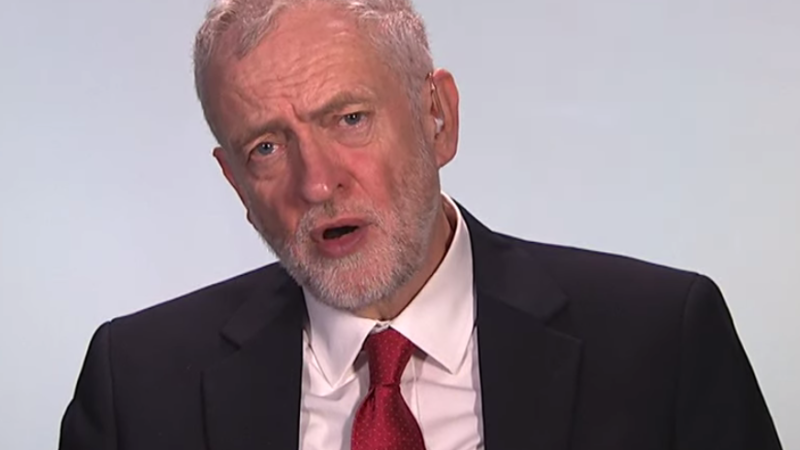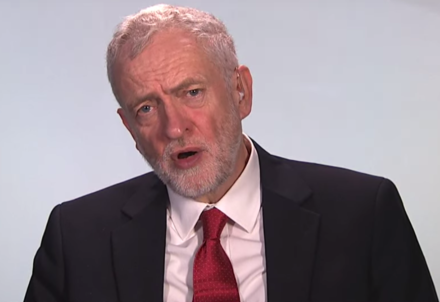

Today’s newspapers have covered extensively Jeremy Corbyn’s Sky News interview in which he was pressed over his meetings with members of the IRA. The stories range from “Corbyn’s kick in the teeth for IRA victims: Labour leader refuses five times to unequivocally condemn IRA”, in the Daily Mail, to the more caveated “Corbyn pressed over IRA comments”, on BBC News online.
Readers can make their own mind up so here is the full transcript of that section of the discussion from Sophy Ridge on Sunday.
Sophy Ridge: I am interested in the kind of issues of your character, your personality because you’re asking people to vote for you to be the next Prime Minister of the UK. I just want to show you this editorial, now this is taken from the Labour Briefing magazine back in December 1984, were you general secretary of the editorial board at the time when that was published?
JEREMY CORBYN: No, I wasn’t even a member of the editorial board.
SR: You weren’t a member of the editorial board? Because according to parliamentary profiles by Andrew Roth, an authoritative …
JEREMY CORBYN: Andrew Roth has a wonderful reputation for having the most inaccurate parliamentary profiles known to anyone.
SR: So you were not a member of the editorial board of that magazine in December 1984, categorically not?
JEREMY CORBYN: No. I read the magazine, I wrote for the magazine but I was not a member of the editorial board.
SR: Okay, what it says in the article just in the wake of the Brighton bombing, an attack by the IRA of course intended to kill Margaret Thatcher, which killed five people, “the British only sit up and take notice when they are bombed into it.” How does that make you feel knowing you wrote for that magazine?
JEREMY CORBYN: I didn’t agree with it, I don’t agree with that position. I’ve always wanted there to be peace in Ireland, I’ve always wanted there to be an accord and eventually in 1994 a ceasefire was agreed. That one disappeared but a second ceasefire came in 1997. I’ve always wanted there to be peace and I really welcomed the Good Friday Agreement and all the achievements it has made since then.
SR: So why did you continue to write for that magazine then?
JEREMY CORBYN: I wrote for the magazine on many issues because it’s a magazine which reaches a number of people within the Labour party and the Labour movement. There are many things in many papers and many magazines with which I profoundly disagree, does that mean I don’t engage? There are programmes on your station that I don’t really agree with and you probably don’t agree with them either, isn’t that what open debate and journalism is about? Sometimes listening to people that you don’t agree with does you good.
SR: Now your associations during the 1980s, which I accept is a long time ago, have clearly come under scrutiny recently and time and time again it does appear as though you backed people who opposed the British forces. You were arrested at a demonstration in support of an IRA terrorist in 1986, you were a regular at IRA linked Troops Out rallies, you didn’t support the SDLP who were trying to pursue a united Ireland through peaceful means so how can you say you were trying to talk to all sides of the agreement when it does appear there is one clear side that you were backing and that is the hard line Republicans?
JEREMY CORBYN: I worked with colleagues in parliament in the SDLP and the Labour party, I visited Northern Ireland on a number of occasions, I met people from right across the spectrum, I went on delegations with the Northern Ireland Committee of the parliamentary Labour party. I represent a constituency which has a very large number of Irish people living in it and I pointed out that the Prevention of Terrorism Act was counter-productive and was criminalising large numbers of wholly innocent Irish people. I took up the cause of the Guildford Four and the Birmingham Six who were grotesquely misjudged by British courts and eventually were freed on the decision of the high court in Britain and I wanted to bring about peace in Ireland. You have to talk to people with whom you don’t agree and I did.
SR: If you have to talk to people with whom you don’t agree, can you talk of any extremist Loyalists then that you spoke to?
JEREMY CORBYN: I met numbers of Loyalists in visits to Stormont and other places and discussions with them and their views about how things could come about because fundamentally the peace in Ireland came about because of the preparedness to talk, because of the Hume-Adams accord, because of what happened after that with the Good Friday agreement.
SR: So can you condemn unequivocally the IRA?
JEREMY CORBYN: Look, bombing is wrong, of course all bombing is wrong, of course I condemn it.
SR: You are condemning all bombing but can you condemn the IRA without equating it to …?
JEREMY CORBYN: No, I think what you have to say is all bombing has to be condemned and you have to bring about a peace process. Listen …
SR: But do you condemn the IRA?
JEREMY CORBYN: Wait a minute, can you allow me to finish please? In the 1980s Britain was looking for a military solution in Ireland: it clearly was never going to work, ask anyone in the British Army at that time. Therefore you have to seek a peace process. You condemn the violence of those that laid bombs that killed large numbers of innocent people and I do.
SR: But can you condemn the IRA, who were responsible for …
JEREMY CORBYN: I just condemned all those that do bombing, all those on both sides.
SR: If you let me finish as well after I let you finish that would be appreciated.
JEREMY CORBYN: All those on both sides that laid bombs.
SR: But can you condemn the IRA who were responsible for 60% of the deaths during the Troubles with the British security services who were responsible for 10%?
JEREMY CORBYN: And there were Loyalist bombs as well which you haven’t mentioned.
SR: Yes, 30%.
JEREMY CORBYN: There were Loyalist bombs as well. I condemn all the bombing by both the Loyalists and the IRA.
SR: But can you just say …
JEREMY CORBYN: Wait a minute, I don’t quite know what point you are trying to make here. Those of us who wanted peace in Ireland worked very hard for it. That Labour government in 1997 worked very effectively to achieve that. It was the Thatcher government that was going in after the collapse of Sunningdale that went very much in the direction of a military solution which clearly didn’t work, hence we eventually got the agreements and the ceasefire which was painstakingly got there but the fundamentals of the accord are that you actually recognise the traditions, all the historical traditions of Ireland, both the Unionist and the Nationalist traditions.
SR: So you don’t believe you did anything wrong and that you have nothing to apologise for?
JEREMY CORBYN: I represent a constituency that had many people who had been criminalised under the PTA. I represented people who had been wrongly put in prison for a very long time for crimes they did not commit. I recognised that you had to bring about a peace process in Ireland, I did my best to assist in that process and that is the way you bring about peace anywhere in the world and later on, after the Good Friday agreement, the Northern Ireland Process became a bit of a model around the world – Martin McGuinness travelled a great deal as did those from the Unionist side as well, to other parts of the world to help try and promote that kind of peace dialogue.
SR: So John McDonnell who has apologised for some of the comments you made, you don’t believe you have anything to apologise for in any of the associations or decisions you made?
JEREMY CORBYN: I’ve told you what my principles behind it were, you are very well aware of what I was doing during that period and I think we’ve achieved a much better place in Ireland. A lot of people made a lot of contributions to that, Unionists, Republicans, MPs from all parties in Britain, political parties of all shapes in Stormont made a contribution to that so Northern Ireland, and indeed the whole of the island of Ireland, is in a much better place as a result of it. The Troubles were a terrible period.
SR: Yes, I think no one would certainly disagree with you on that point.
JEREMY CORBYN: And I’ve talked to people in the Army, soldiers who were there at the time, they would agree as well.




More from LabourList
Letters to the Editor – week ending 1st February 2026
‘Marketised social care has failed. It’s time to rebuild local, democratic social services’
Former Labour General Secretary David Triesman dies aged 82